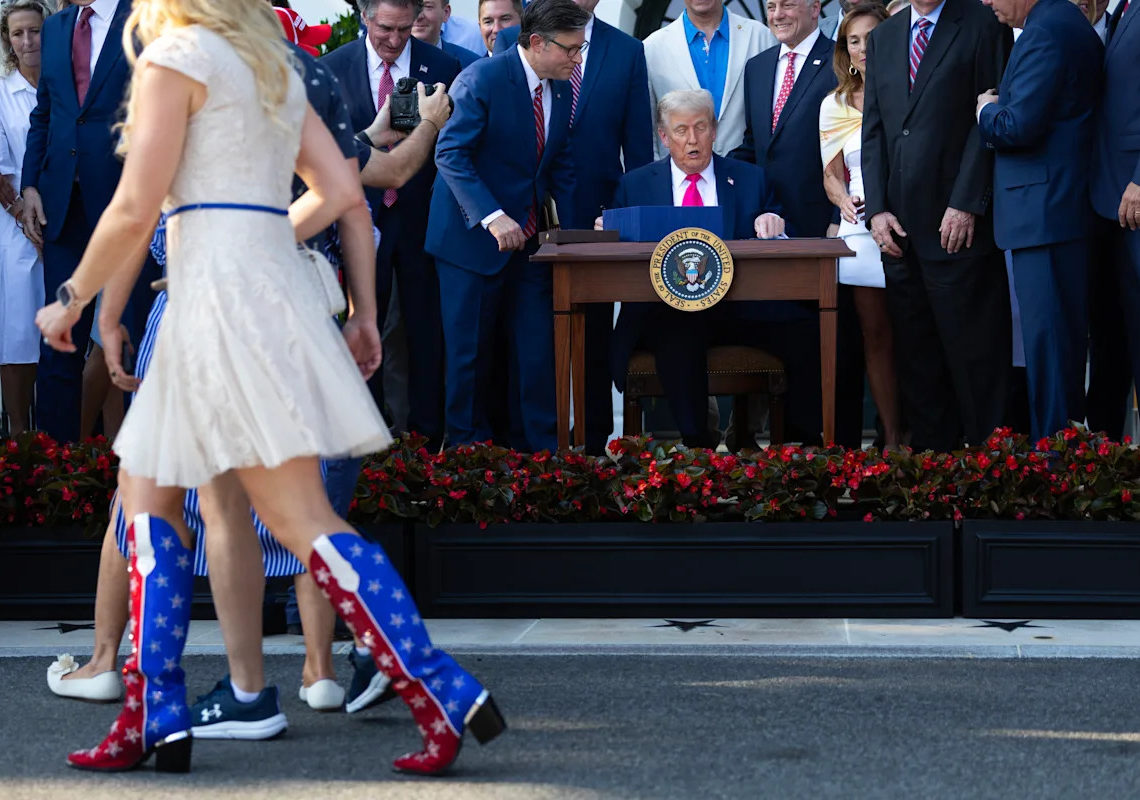Kimberly Hoover has been to most Michelin-star restaurants on the East and West coasts. She and her wife, multimillionaires from their real estate firms, own homes in or near New York City, Washington, Miami and Quebec. Their lives are filled with skiing, fine wine and long trips to Europe.
Hoover’s accountant estimates that the new tax law that President Donald Trump signed this month will save her several million dollars over the next few years. While many Americans might rejoice at that kind of windfall, Hoover worked hard to stop it from becoming a reality, arguing to lawmakers that she has more money than she needs.
“At some point, it starts to feel wrong. It starts to feel excessive. It starts to feel somehow inappropriate. And at some point, it just doesn’t feel good,” said Hoover, who spoke while on break from a sapphic literature conference she helps sponsor in Albany. “Imbalanced is really not good for anyone, even if you’re on the positive end of that imbalance, because it’s unsustainable.”
Hoover’s experience reflects an unusual irony of Trump’s signature tax legislation: Many of its biggest beneficiaries fiercely oppose the president – and even oppose policies he is pushing that will make them richer.
The mismatch is partly a result of a crucial, if ongoing, evolution of the role class plays in American politics.
During the administrations of Ronald Reagan, George H.W. Bush, and George W. Bush, affluent Americans who benefited from tax cuts were more likely to be Republicans. The political party they supported delivered material benefits that boosted their pocketbooks. Democratic voters, by comparison, were more likely to be working or middle class.
Now, more than half of upper-income families – defined as those earning more than $215,400 per year – vote Democratic, according to a 2024 Pew Research survey, as more highly educated voters shift to the left. The top fifth of earners went from supporting Barack Obama in 2008 by a 2.5-point margin to supporting Joe Biden in 2020 by close to 15 percentage points. “Affluent Americans used to vote for Republican politicians. Now they vote for Democrats,” one 2023 paper found. That shift intensified during the 2024 presidential election, when large numbers of Black and Latino voters, who tend to be lower-income, defected to the Republican ticket for the first time in decades, according to several political scientists, exit polls and studies.
“There’s been a lot of talk about how even though the Republican coalition has changed and gotten more working class, their policies have not,” said Matt Grossmann, a political scientist at Michigan State University. “But there’s been less attention to a similar but true fact on the other side – a lot of Democratic politicians were elected by very rich constituents who are more likely to benefit from Republican tax policy than Democratic policy.”
As a result, many of the provisions of the GOP tax law will benefit a voting bloc that is increasingly Democratic.
The $3.4 trillion legislation extends a lower tax rate for the top tax bracket, rejecting the president’s suggestion of a new tax on million-dollar earners. It expands and makes permanent a smaller federal estate tax, allowing up to $15 million to be passed on tax-free ($30 million for couples). It also makes permanent a large deduction for businesses formed as pass-through entities, while raising the cap on what filers can deduct in state and local taxes. (The GOP’s 2017 tax law also permanently lowered the corporate tax rate from 35 percent to 21 percent.)
When all these provisions are combined, Trump’s second tax bill devotes roughly $1 trillion in tax cuts for those earning more than $400,000 per year – roughly the size of the law’s cuts to Medicaid, the federal health insurance program for the poor. (Most of the bill’s cost, though, comes from provisions that largely benefit middle-class households, such as a larger child tax credit and standard deduction.)
Steve Lockshin, a financial adviser and co-founder of the estate advisory platform Vanilla, represents clients with at least $50 million and whose fortunes are sometimes in the billions of dollars. A tax cut of about 2 percent for a middle-class family translates into about $1,800 per year, according to the Tax Policy Center, a nonpartisan think tank. But for Lockshin’s clients, saving several percentage points in taxes can mean hundreds of thousands of dollars, if not millions, per year.
One provision that has become particularly beneficial to his clients is the law’s expansion of “Opportunity Zones,” which allow investors to defer capital gains taxes by reinvesting profits into designated economically distressed areas. The program allows wealthy individuals to delay or, in some cases, permanently avoid paying taxes on capital gains if they make investments in specified zones.
“The general mentality is the same across the board with my clients: ‘I want to pay the least I can. I also want the best for my country, and I would invert the two if it had a meaningful impact,’” Lockshin said. “And if you are wealthy – but aren’t pro-Trump and just along for the ride – most of my network is thinking, ‘While Rome is burning, at least I’ll save a few dollars in taxes.’”
Opposition to tax cuts has surfaced in many wealthy liberal enclaves. At the Harvard Club in New York City, “everyone under 50 feels this way,” said Bob Elliott, chief executive of Unlimited, an investment firm.
“The classic question is how much do you worry about it benefiting yourself versus the societal consequences – that’s the trade-off,” Elliott said. “Many of the people who don’t like the bill are saying, ‘Really, even if I get money, it’s still at the expense of taking people off Medicaid.’” Nonpartisan estimates have found that the GOP tax law will lead to more than 13 million fewer Americans having health insurance.
Some experts say rich people have self-interested reasons to oppose the tax cuts that go beyond the broader social consequences. Many of the law’s short-term benefits come with long-term drawbacks, said Constance Hunter, chief economist at the Economist Intelligence Unit, a research firm. That, she said, is because many people at least intuitively understand the concept of “Ricardian equivalence” – the idea that deficits will need to be paid for eventually through higher taxes, so consumers adjust their behavior accordingly by saving more in preparation.
“I think there are a number of people, some of whom are affluent and that span the political spectrum, who realize we cannot keep expanding our deficits indefinitely, especially at a time when our economy is showing resilience and growing,” Hunter said. “A lot of wealth is held by business owners, and while certain provisions may be providing tax cuts now, these are likely to be accompanied by greater financing costs for business owners,” as reflected in the higher interest rates needed to combat increases in inflation.
Drew E. Pomerance, a Los Angeles lawyer in business and commercial litigation, said that his net worth is in the tens of millions of dollars and that he will probably save tens of thousands of dollars from the law every year. While he said “it never ceases to amaze me that people vote against their own economic self-interest,” he also said he will benefit from the bill but thinks “it’s terrible for America.”
“Don’t get me wrong: I like money. I like having money. I’m not opposed to having money,” he said. “But at the expense of what it does to the rest of the country, it should not be a priority to give me and other rich people more money.”
The willingness of some liberals to vote against their economic self-interest should give them pause before they accuse conservatives of doing the same, said Michael Strain, an economist at the American Enterprise Institute, a right-leaning think tank. He said Republican voters in lower-income states are often unfairly maligned this way, pointing to the 2004 book “What’s the Matter With Kansas?”
“Nothing is the matter with Kansas. The people of Kansas vote for a variety of reasons, one of which is economic self-interest,” Strain said.
Some multimillionaires, such as Morris Pearl, who served as managing director at the investment firm BlackRock, say they are getting money from the tax cut they do not need. (Pearl, like Hoover and Pomerance, is part of Patriotic Millionaires, a group of rich Americans devoted to trying to raise taxes on the rich.) Pearl’s mother-in-law died last year, and he and his wife benefited from the 2017 changes to the estate tax. He has taken advantage of the low-tax Opportunity Zone rules, though he does not remember where or how much he has invested. He will probably continue to do so now that they have been extended.
“It’s great for me personally, financially,” Pearl said. “But even looking at my own and my family’s long-term self-interest, I would prefer less inequality and less of a country of very rich and very poor, and more of a country with lots of people doing all right.”
In August, Pearl is traveling to a fundraiser for Democratic lawmakers in California. Every year, he donates hundreds of thousands of dollars to Democratic politicians, which he described as the first thing he would cut back on if his fortune started to shrink.
Thanks in part to the GOP tax law, Pearl added, that is not going to happen any time soon.
Related Content
Hulk Hogan was a well-known Trump supporter. Their ties go back 40 years.
Mendelson reaches deal with Commanders on RFK site amid growing pressure
Amy Sherald cancels major Smithsonian show over ‘censorship’
The post They’re rich. They’re anti-Trump. And they don’t want their big tax cut. appeared first on Washington Post.




